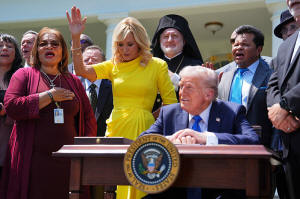Trump energizes conservative Christians with new religious policies
[August 08, 2025]
By PETER SMITH
In his first half-year in office — amid his tariff campaign,
government-slashing moves and immigration crackdown — President Donald
Trump has also repeatedly delivered for conservative Christians, who
form the bedrock of his Republican support.
While he has made overtures to Jewish, Muslim and other religious
groups, his Christian supporters have been among his most high-profile
surrogates and appointees.
The Trump administration has green-lit political endorsements from the
pulpit and encouraged religion in the federal workplace. Trump has
established faith-focused entities with numerous influential Christian
appointees. He’s energized supporters with assaults on cultural and
academic targets long seen as liberal bastions. His administration and
his Supreme Court appointees have expanded areas for religious
exemptions and expression in the public square.
“We’re bringing back religion in our country,” Trump contended at a Rose
Garden event on the National Day of Prayer in May.
His faith adviser, pastor Paula White-Cain, proclaimed that in his
administration, faith “has been brought back to where it always belongs,
and that is center.”
Critics say he's eroding the separation of church and state.
“The ones celebrating this are the ones leaning toward this Christian
nationalist bent, this ideology that Christians should have dominion
over the United States government,” said the Rev. Shannon Fleck,
executive director of Faithful America, a progressive Christian group.

“A president with a true Christian agenda would be most concerned with
uplifting those in our country who have been cast aside,” she said. “The
most vulnerable among us are not billionaires. Those most vulnerable
among us are not these manipulators of Christianity that are seeking
nothing but power."
Here are 10 ways Trump has repaid his supporters, particularly
conservative evangelicals and Catholics:
Crackdowns on transgender identity and treatment
Trump has cracked down on transgender identity and medical treatment,
long targets of religious conservatives.
He signed an executive order on his first day in office recognizing only
male and female as biologically determined sexes. Another order aimed to
eliminate federal support for gender-affirming care for young people,
which several medical institutions have discontinued.
Still another order aimed to ban transgender athletes from girls' and
women’s sports. The University of Pennsylvania, under a federal civil
rights investigation, modified school records previously set by
transgender swimmer Lia Thomas and said it would apologize to female
athletes “disadvantaged” by her participation.
Pastors, politics and the IRS
The IRS declared on July 7 that pastors can endorse political candidates
from the pulpit without risking their churches’ tax-exempt status. The
move effectively calls for a carve-out for religious organizations from
the IRS rule known as the Johnson Amendment, enacted in 1954 and named
after then-Sen. Lyndon Johnson.
That rule said churches and other nonprofits could lose their tax-exempt
status if they participate in any political campaign for or against any
candidate. The rule was rarely enforced, though some conservative
religious leaders spent years vocally claiming it was violating their
freedom of religion and speech. Trump had vowed in 2017 to “destroy” the
Johnson Amendment.
Targeting Planned Parenthood
Trump signed budget legislation aimed at cutting Medicaid payments to
Planned Parenthood, the nation’s biggest abortion provider and a
longtime target of Christian conservative groups.
U.S. law already bars federal funding for abortion, but the latest cuts
target other services offered by the organization, such as contraception
and cancer screenings.
Trump in January pardoned anti-abortion activists who had been convicted
of blockading abortion clinic entrances.

Evangelist-led faith office
Trump created a White House faith office led by White-Cain, a longtime
pastor and evangelist in the independent charismatic world. While past
presidents have had similar White House outreach to faith-based
communities, this appointment puts one of Trump’s earliest high-profile
Christian supporters in a strategic position. White-Cain held a similar
post in the first Trump administration.
Task force on anti-Christian bias
Trump created a Task Force to Eradicate Anti-Christian Bias, chaired by
Attorney General Pam Bondi and composed of high-ranking government
representatives. Its two-year mandate is to “identify any unlawful
anti-Christian” actions allegedly taken by the previous administration
of President Joe Biden, a Democrat, and to recommend changes. The order
cites grievances voiced by conservative Christian leaders in recent
years, though skeptics questioned how those grievances were portrayed
and whether the nation’s most dominant religious demographic needed
special protections.
[to top of second column]
|

President Donald Trump sits at a desk as he and religious
leaders listen to a musical performance before Trump signs an
executive order during a National Day of Prayer event in the Rose
Garden of the White House, May 1, 2025, in Washington. (AP
Photo/Evan Vucci, File)

Religious Liberty Commission
Trump created a Religious Liberty Commission. It includes several
conservative Christian clerics and commentators, some of whom have
supported Trump politically. Its chair, Texas Lt. Gov. Dan Patrick,
supports prayer and Ten Commandments postings in public schools.
The commission’s announcement came at a White House prayer event at
which Trump said of the concept of church-state separation, “Let’s
forget about that for one time.”
Evangelical ambassador to Israel
Trump appointed former Arkansas Gov. Mike Huckabee, a Southern
Baptist minister and prominent religious conservative, as ambassador
to Israel.
Huckabee reflects the unwavering support for Israel among many
evangelicals, who see it as favored by God and largely dismiss
criticisms of Israel’s war with Hamas and aid restrictions in Gaza.
Huckabee was confirmed by the Senate despite concerns he previously
supported Israel’s right to annex the occupied West Bank. He pledged
to “carry out the president’s priorities, not mine.”
Religion in the federal workplace
The Office of Personnel Management said in a July 28 memo that
federal employees may promote and talk about their religion with
fellow employees on the job, so long as it’s not “harassing in
nature.”
They can display religious items at work and encourage co-workers
“to participate in religious expressions of faith, such as prayer,”
the memo said. Office Director Scott Kupor said federal workers
“should never have to choose between their faith and their career.”
Critics said this erodes church-state separation, potentially
creating a hostile workplace environment. Rachel Laser, president of
Americans United for Separation of Church and State, said “this memo
encourages federal workers to abuse the power of their positions by
imposing their religious beliefs on others.”

Supreme Court impact
Trump hasn’t made Supreme Court appointments yet this term. But his
three first-term picks — Neil Gorsuch, Brett Kavanaugh and Amy Coney
Barrett — continue to deliver for the Christian conservatives and
their allies from other faiths who cheered their appointments.
The high court ruled in June that Maryland parents with religious
objections can pull their children from public school lessons using
LGBTQ+ storybooks; that Tennessee can ban gender-affirming care for
transgender minors; and that states can block Planned Parenthood
from receiving Medicaid money.
All three were decided by the same 6-3 margin, with Trump's
appointees in the court’s conservative supermajority.
Fighting a culture war
Trump launched a wide-ranging culture war against universities,
museums, public broadcasters and other institutions.
These targets have long been accused of liberal bias by religious
and other conservatives, even though specific grievances and
circumstances varied.
Trump has cut funding, forced out officials or otherwise demanded
changes at the Smithsonian Institution, the Library of Congress, the
Kennedy Center and the National Endowment for the Humanities. He
signed a congressional action slashing funding for public
broadcasting.
The Trump administration also cut research funding at several elite
U.S. colleges, some of which have offered financial payments and
other concessions to his political agenda in an effort to regain
funding.
It has also worked to suppress diversity, equity and inclusion
programs at government agencies and private corporations.
___
Associated Press religion coverage receives support through the AP’s
collaboration with The Conversation US, with funding from Lilly
Endowment Inc. The AP is solely responsible for this content.
All contents © copyright 2025 Associated Press. All rights reserved
 |